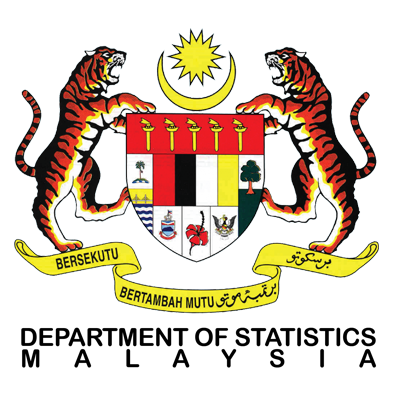Malaysia External Trade Statistics
- Home
- Statistics
- Economy
- External Sector
- Malaysia External Trade Statistics
Malaysia External Trade Statistics May 2019
Malaysia External Trade Statistics April 2019 3 May 2019
Malaysia External Trade Statistics March 2019 4 April 2019
Malaysia External Trade Statistics February 2019 4 March 2019
Malaysia External Trade Statistics January 2019 30 January 2019
Malaysia External Trade Statistics December 2018 4 January 2019
Malaysia External Trade Statistics November 2018 Show all release archives
Overview

KEY FACTS
MONTHLY
- In May 2019, exports increased 2.5% to RM84.1 billion year-on-year (y-o-y). Domestic exports recorded an increase of 8.8% or RM5.8 billion to RM71.6 billion. However, re-exports was valued at RM12.5 billion registering a decline of 23.1% y-o-y and accounted for 14.8% of total exports.
- Imports also registered an increase of 1.4% y-o-y to RM75.1 billion.
- On a month-on-month (m-o-m) basis, exports decreased 1.2% from RM85.2 billion. In seasonally adjusted terms, exports also declined 1.2%.
- On a m-o-m basis, imports recorded a growth of 1.0% from RM74.3 billion. In seasonally adjusted terms, imports decreased 4.0%.
- On a y-o-y basis, exports grew due to the increase in exports to India (+RM1.2 billion), the United States (+RM816.0 million) and the Philippines (+RM515.1 million). However, exports decreased to the European Union (-RM558.9 million) and Australia (-RM380.8 million).
- On a y-o-y basis, higher imports were mainly from the United States (+RM1.6 billion) and Indonesia (+RM582.1 million). Meanwhile, lower imports were from Iraq (-RM550.4 million) and Taiwan (-RM494.6 million).
TRADE
Total trade which was valued at RM159.2 billion increased RM3.1 billion or 2.0% in May 2019. However, it fell RM292.7 million or 0.2% when compared to the April 2019. The trade surplus was RM9.1 billion and recorded an increase of RM965.6 million (+11.9%) from a year ago. However, it shrank 16.0% or RM1.7 billion as compared to the previous month.
EXPORTS
On a y-o-y basis, exports increased 2.5% to RM84.1 billion. The main products which attributed to the expansion were:
- Palm oil and palm oil-based products (7.4% of total exports), grew RM437.8 million (+7.6%) to RM6.2 billion. Exports of palm oil, the major commodity in this group of products increased RM663.6 million or 20.8% due to the increase in export volume (+44.0%) as average unit value decreased 16.1%;
- Timber and timber-based products, which contributed 2.4% to total exports increased RM258.8 million or 15.0% to RM2.0 billion;
- Electrical and electronic (E&E) products (34.9% of total exports), grew RM159.9 million (+0.5%) to RM29.3 billion; and
- Natural rubber (0.4% of total exports) increased RM17.6 million or 5.3% to RM352.5 million due to the increase in average unit value (+6.0%) as export volume decreased 0.7%.
However, decreases were recorded for the following products:
- Refined petroleum products, which accounted for 7.2% of total exports, shrank RM1.1 billion or 15.5% to RM6.0 billion due to the decrease in export volume (-24.0%) as average unit value rose 11.2%;
- Crude petroleum, which contributed 3.0% to total exports dropped RM621.3 million or 20.0% to RM2.5 billion due to the decrease in export volume (-23.7%) as average unit value rose 4.8%; and
- Liquefied natural gas (LNG), which accounted for 3.5% of total exports decreased RM162.7 million or 5.2% to RM3.0 billion due to the decrease in export volume (-6.4%) as average unit value increased 1.3%.
On a m-o-m basis, exports declined RM1.0 billion (-1.2%) from RM85.2 billion. The main products which contributed to the decrease were:
- E&E products decreased RM3.8 billion (-11.4%) from RM33.1 billion;
- LNG decreased RM630.4 million or 17.5% from RM3.6 billion due to the decrease in both export volume (-14.2%) and average unit value (-3.9%); and
- Refined petroleum products shrank RM351.8 million (-5.5%) from RM6.4 billion due to the decrease in export volume (-9.1%) as average unit value increased 4.0%.
However, the following products recorded a growth:
- Palm oil and palm oil-based products grew RM1.0 billion or 19.8% from RM5.2 billion. Exports of palm oil increased RM776.2 million or 25.3% due to the increase in export volume (+27.5%) as average unit value decreased 1.7%;
- Crude petroleum rose RM590.9 million or 31.2% from RM1.9 billion due to the increase in both export volume (+24.3%) and average unit value (+5.6%);
- Timber and timber-based products increased RM190.7 million (+10.6%) from RM1.8 billion; and
- Natural rubber grew RM17.6 million or 5.3% from RM334.9 million due to the rise in both average unit value (+3.6%) and export volume (+1.6%).
Exports to Country of Destination
The two major destinations for Malaysia’s exports in May 2019 were Singapore and China. Exports to Singapore amounted to RM11.4 billion recording an increase of RM285.0 million (+2.6%) as compared to the previous year.
The main product which attributed to the rise was refined petroleum products (12.6% of total exports), increased RM156.0 million or 12.2% to RM1.4 billion.
Exports to China which were valued at RM11.3 billion declined RM252.0 million (-2.2%).
The main products which attributed to the decrease were:
- E&E products, which contributed 35.4% of total exports shrank RM474.0 million (-10.6%) to RM4.0 billion; and
- Palm oil and palm oil-based products (5.6% of total exports), declined RM128 million or 16.8% to RM634.0 million.
Seasonally Adjusted Figure
On a m-o-m basis seasonally adjusted terms, exports decreased RM1.0 billion (-1.2%) to RM85.7 billion.
Exports, 2015-2019

IMPORTS
On a y-o-y basis, imports grew RM1.1 billion or 1.4% to RM75.1 billion. The increase in imports was mainly attributed to intermediate goods and consumption goods.
- Intermediate Goods
These goods which constituted 56.8% of total imports increased RM2.6 billion (+6.4%) to RM42.6 billion. The growth was mainly attributed to industrial supplies, processed (+RM2.4 billion, +16.1%), parts & accessories of transport equipment (+RM631.6 million, +28.8%) and fuel & lubricants, processed, others (+RM631.3 million, +38.8%).
However, import of parts & accessories of capital goods (except transport equipment) declined RM1.1 billion or 7.9%.
- Consumption Goods
Imports of consumption goods which constituted for 8.8% of total imports grew RM651.7 million (+10.9%) to RM6.6 billion. The growth was mainly attributed to food & beverages, processed, mainly for household consumption (+RM312.1 million, +19.2%), non-durables (+RM194.2 million, +13.2%) and durables (+RM99.1 million, +12.3%).
- Capital Goods
Imports of capital goods, which accounted for 12.3% of total imports, declined RM576.9 million (-5.9%) to RM9.3 billion due to the decrease in transport equipment industrial (-RM1.5 billion, -60.1%). However, capital goods (except transport equipment) rose RM896.9 million or 12.2%.
On a m-o-m basis, imports increased RM717.2 million or 1.0% from RM74.3 billion. All main categories of imports by end use recorded increases.
- Intermediate Goods
These goods rose RM1.9 billion (+4.6%) from RM40.7 billion. The main components contributed to the increase were parts & accessories of capital goods (except transport equipment) (+RM1.8 billion, +16.3%), fuel & lubricants, processed, others (+RM307.1 million, +15.8%) and parts & accessories of transport equipment (+RM201.7 million, +7.7%). However, food & beverages, primary, mainly for industries decreased RM177.9 million or 23.5%.
- Capital Goods
Imports of capital goods increased RM390.3 million (+4.4%) from RM8.9 billion due to the increase in both transport equipment, industrial (+237.4 million, +31.9%) and capital goods (except transport equipment (+RM152.9 million, +1.9%).
- Consumption Goods
Imports of consumption goods registered an increase of RM15.9 million (+0.2%) from RM6.6 billion. The increase was due to food & beverages, processed, mainly for household consumption (+RM102.8 million, +5.6%) and non-durables (+RM43.2 million, +2.7%). However, durables decreased RM51.8 million or 5.4%.
Imports by Country of Origin
The two main sources of Malaysia’s import in May 2019 were China and the Singapore. Imports from China which registered RM15.3 billion shrank RM335.0 million (-2.1%) when compared to May 2018.
The main products which attributed to the decrease were:
- Refined petroleum products (4.8% of total imports), decreased RM775.0 million or 50.8% to RM731.0 million; and
- E&E products, which contributed 34.5% of total imports declined RM197.0 million or 3.6% to RM5.3 billion.
Imports from the Singapore declined RM479.5 million (-5.8%) to RM7.8 billion from a year ago. The main product which attributed to the decrease was E&E products (22.9% of total imports), decreased RM865.0 million or 32.8% to RM1.8 billion. However, the imports of gold, non-monetary (4.8% of total imports), increased RM220.0 million or 142.9% to RM373.9 million.
Seasonally Adjusted Figure
On a m-o-m basis seasonally adjusted terms, imports declined RM3.1 billion (-4.0%) to RM74.0 billion.
Imports, 2015-2019

MARKET SHARE
The following charts show Malaysia's major trading partners for January - May 2019.
Total Trade by Major Countries, Jan – May 2019, percentage share

Exports and Imports by Major Countries, Jan –May 2019, percentage share

The following charts show Malaysia’s trade with ASEAN countries for January – May 2019.
Exports, Jan –May 2019, percentage share

Imports, Jan –May 2019, percentage share

#Notes:
1. The May 2019 data is provisional and subject to revision in later issues.
2. This report can be accessed through the web portal of the Department of Statistics, Malaysia (https://www.dosm.gov.my) under section: Latest Release.
Released By:
DATO' SRI DR. MOHD UZIR MAHIDIN
CHIEF STATISTICIAN MALAYSIA
DEPARTMENT OF STATISTICS, MALAYSIA
![]() DrUzir_Mahidin
DrUzir_Mahidin ![]()
![]() Dr_Uzir
Dr_Uzir
4 JULY 2019
Contact person:
Public Relation Officer
Strategic Communication and International Division
Department of Statistics, Malaysia
Tel : +603-8885 7187 / 7942
Fax : +603-8888 9248
Email : jpbkkp[at]dosm.gov.my
Subscribe
Newsletter
Subscribe to our newsletter and stay updated
For interviews, press statement and clarification to the media, contact:
Baharudin Mohamad
Public Relation Officer
Email: baharudin[at]dosm.gov.my
Phone: 03 8090 4681
Not found what you looking for? Request data from us, through
Go to eStatistik
Email: data[at]dosm.gov.my
Phone: 03 8885 7128 (data request)










